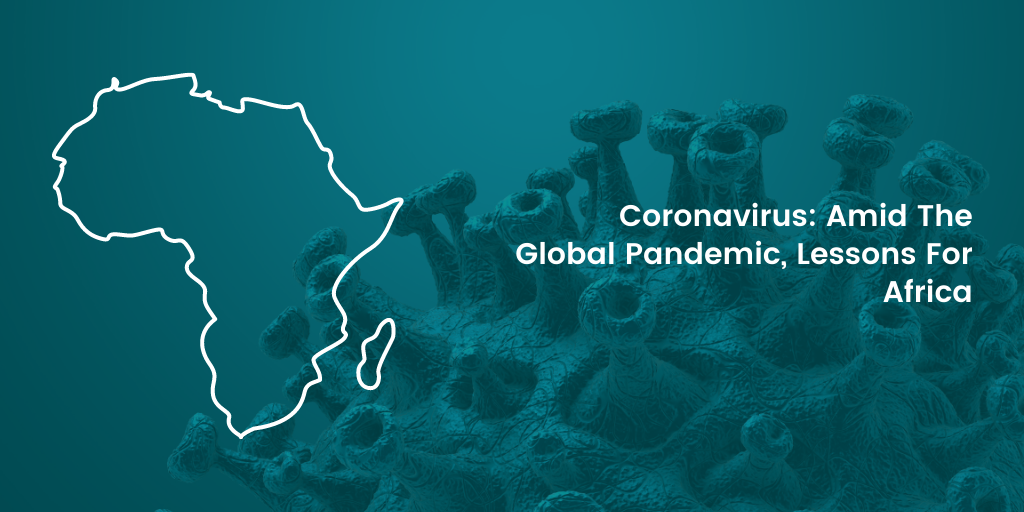The novel coronavirus, COVID-19, has created an unprecedented global health emergency. Several African countries have taken a variety of actions to prevent the spread of coronavirus and mitigate its impact on livelihoods and their overall economies. At the peak of the pandemic, countries such as Rwanda, Uganda,
and South Africa were under a nationwide lockdown, others like Benin, Ghana, Kenya, DRC, Cote D’Ivoire, and Nigeria imposed partial lockdowns in targeted areas. On the other hand, Tanzania, Zambia, and Mozambique did not have any lockdown measures. Overall, the impact of these measures has been mixed, with countries such as Kenya and South Africa experiencing spates of violence and others such as Nigeria and Kenya, having to ease these measures due to hardships faced by vulnerable and poor people. Indeed, many countries in the sub-Saharan Africa region have found it challenging to find a good balance between mitigating the economic impact of the COVID-19 response and the potential loss of life.
So how far have we fared in sub-Saharan Africa? What has worked? What has failed? And how can we move forward as we become more aware of the inevitable – a future with many more pandemics? It is against this background that SPARC, has made an effort to synthesize the learnings from sub-Saharan countries on how they have responded to COVID-19. Throwing more light on the successful interventions that have been experienced in various country responses enables us to propose recommendations for other African countries to step up measures to strengthen their health systems, especially in the area of health systemsresilience and responsiveness. The learnings cut across issues such as funding and investments in the health sector, partnerships, payment systems, data availability and usage, governance and accountability.
In the wake of the rising economic crisis posed by the pandemic, funding of COVID-19 and the health sector remains a primary objective of every country. Many governments recognize that COVID-19 is a health crisis that has to be addressed by increasing health spending, and yet they are faced with the tradeoffs with the reallocation of currently available resources. In April 2001, African countries pledged to set a target of allocating at least 15% of their annual budget to improve the health sector.1 Nineteen (19) years down the line, only a few African countries have implemented this Abuja declaration. Although multiple sources of funding have been explored, reliance on donor funding to bolster and sustain the fight against the virus is visible in many African countries. For instance, Ghana benefited from a US$ 100 million COVID-19 financial facility from the World Bank at the onset of the pandemic, as part of its 14 billion stimulus package for developing countries.2
As countries receive funding from multiple streams, effective coordination of the COVID-19 response has remained critical for the success of the interventions. Most countries have clearly defined oversight responsibilities, well-delineated institutional functions, regulatory responses, health worker incentives and treatment and prevention policies which have mostly modelled WHO advisories and guidelines for the pandemic.3 Country responses have primarily been overseen by the Presidency using all of the government approach marked by public information sharing. Some countries have developed incentives for health workers and regulated movement and social distancing. For instance, in Rwanda, donor coordination has been effective because of the existing trust, accountability mechanisms and strong relationships and regulations between donors and the government. On the other hand, coordination mechanisms in other countries have not been as successful.
The lack of coordination seen in some countries has created parallel systems with pockets of activities, fragmented across different sectors and agencies. Aside from the procurement of essential goods and services, the uncertainties brought about by the evolving COVID-19 situation has become a challenge for procurement and supply chain. Since public procurement is at the frontline of countries’ responses to the crisis, the need to increase coordination becomes paramount. Even though a centralized and coordinated approach has been introduced, supply chain mechanisms to ensure that lower-level facilities are provided with adequate supplies have not been as efficient.
As governments grapple with the response, one of the main learnings is the potential role of the private sector, not only in boosting services, but also in mobilizing resources for the response. Prior to this pandemic, the role of the private sector in the health sector was limited to service provision, and many countries struggled to form partnerships that will bring in private funding. Governments have been forced to create platforms where private sector entities provide both funding and innovative technologies to support the COVID-19 response. In Ghana, the vision and drive of the Ghana COVID-19 Private Sector Fund, has led to the construction of Ghana’s first infectious disease treatment centre in Accra. In Nigeria, there are efforts to institutionalize the current private-sector coalition to strengthen the health system and support primary health care delivery systems. There is a great opportunity for innovation in this crisis which has led to the strengthening of digital health services, eHealth, telehealth, many of these facilitated by the private sector. Harnessing the private sector and including private providers in a fair and transparent process seems to be the expedient way to add the needed capacity and innovation.
With the pandemic, countries are becoming more aware of the need to take control of purchasing agreements. Strategic purchasing for COVID-19 related goods and services has been a broad goal. Specifically, key agencies leading the implementation of the COVID-19 response in many of the countries researched were encouraged to ensure that COVID-19 fund transfers were linked to optimum results to strengthen the strategic purchasing function in all aspects of the recovery. Despite these, there have been challenges such as shortage of PPEs for health workers, non-availability of essential drugs for case management, inadequate intensive care units (ICUs) and insufficient human resources.
New purchasing structures have evolved, sometimes operating in parallel to existing purchasing mechanisms. In many countries, free COVID-19 testing and care have been prioritized. However, there have been some cases of uncoordinated purchasing where services paid through government budgets were also subject to insurance reimbursement. Kenya and Ghana have showcased some good examples of coordinated purchasing where COVID-19 services, reimbursable by their respective national health insurance schemes, were clarified after some initial uncertainties. Therefore, an ideal pandemic response should have well-coordinated purchasing functions that ensure that priority services are made available to the population using well defined contracting methods that can be tracked for performance.
The pandemic has not only shown the need for flexibility in the allocation of resources but has also raised concerns about accountability. Many countries have realized that they could still incorporate some elements of their regular Public Financial Management (PFM) processes in the management of the COVID-19 funds. Typically, this involves managing the disbursements and main transactions through regular PFM and procurement mechanisms while using separate banking arrangements. An example is Ghana, where private funds are collected through separate bank accounts but are transferred to the national Coronavirus Alleviation Programme, which is managed by the Treasury.
Related to this is the fact that data-driven procurement practices are critical during this global emergency. Data and communication management have been noted to be key enablers of strategic purchasing. In light of limited resources, one of the key learnings is that countries that rely on information and data flow to purchase goods and services are able to spend more efficiently whilst ensuring value for money. The COVID-19 pandemic has re-emphasized this need. There appears to be a renewed focus on the integration of data sources during and post COVID-19. This also calls for improving interoperability of data systems and building the capacity of providers to interpret their data to inform service delivery.
One of the areas flagged in the assessment of country responses is the crowding-out of essential services. The evidence shows that adequate progress has not yet been made in assuring the continuity of essential services during this pandemic. The area which has been affected most is childhood immunization, which the World Health Organization estimated will affect about 80 million children in 68 countries.5 The investment in infrastructure, building of capacity of health workers and health innovations that have attended COVID-19 responses may have the potential to help crowd-in essential services. For the impact of these to be fully realized, countries should pay more attention to improving their early warning systems for tracking access to essential services as well as developing contingency plans to ensure access to these services.
Going forward pandemic response plans should be constantly reviewed and funded to ensure improved disease surveillance, testing, upgrading of public health infrastructure, capacity building, evidence generation, public education and a decentralized response. True health systems strengthening requires the country to build effective financing mechanisms, including efficient public financial management systems, that can support the delivery of quality health services. We must turn these crises into opportunities to build on existing systems, learn, innovate, and strengthen transparency and good governance. Value for money should underlie the allocation of resources in all resource-constrained environments. It should be an integral part of the planning, monitoring and evaluation processes. Also, there is the need to strengthen the capacity for evidence generation and use; engage frontline workers as part of the response and ensure that resources reach them; put in place transparent purchasing frameworks that make roles, relationships, and expectations clear.
References
- African Union Heads of State (2001) ‘Abuja declaration on HIV/AIDS, tuberculosis and other infectious diseases and plan of action’, African summit on HIV/AIDS tuberculosis and other infectious diseases, 24–27 April OAU, Addis Ababa, at http://www.un.or/ga/aids/pdf/abuja_declaration.pdf
- World Bank 2020 World Bank Group Supports Ghana’s COVID-19 Response https://www.worldbank.org/en/news/press-release/2020/04/02/world-bank-group-supports-ghanas-covid-19-response
- Fazeer Rahim, Richard Allen, Hélène Barroy, Laura Gores and Joseph Kutzin. (2020) COVID-19 Funds in Response to the Pandemic &uri=https%3A%2F%2Fblog-pfm.imf.org%2Fpfmblog%2F2020%2F08%2F-covid-19-funds-in-response-to-the-pandemic-.html” class=”first”>Email this
- Barroy, H., D. Wang, C. Pescetto, and J. Kutzin. 2020. “How to Budget for COVID-19 Response? A Rapid Scan of Budgetary Mechanisms in Highly Affected Countries.” World Health Organization, Geneva.
- World Health Organization. Guiding principles for immunization activities during the COVID-19 pandemic [Internet]. [cited 2020 September 16]. Available from: World Health Organization; 2020. https://apps.who.int/iris/bitstream/handle/10665/331590/WHO-2019-nCoV-immunization_services-2020.1-eng.pdf.

Dr. Ama Pokuaa Fenny is a Research Fellow with the Institute of Statistical, Social and Economic Research (ISSER) at the University of Ghana. She has researched and published in the area of developmental issues in institutional and health economics. Her current research areas include health financing, health-seeking behaviour, integration of governmental policies into service delivery systems in Africa, social protection and gender-based analysis.

